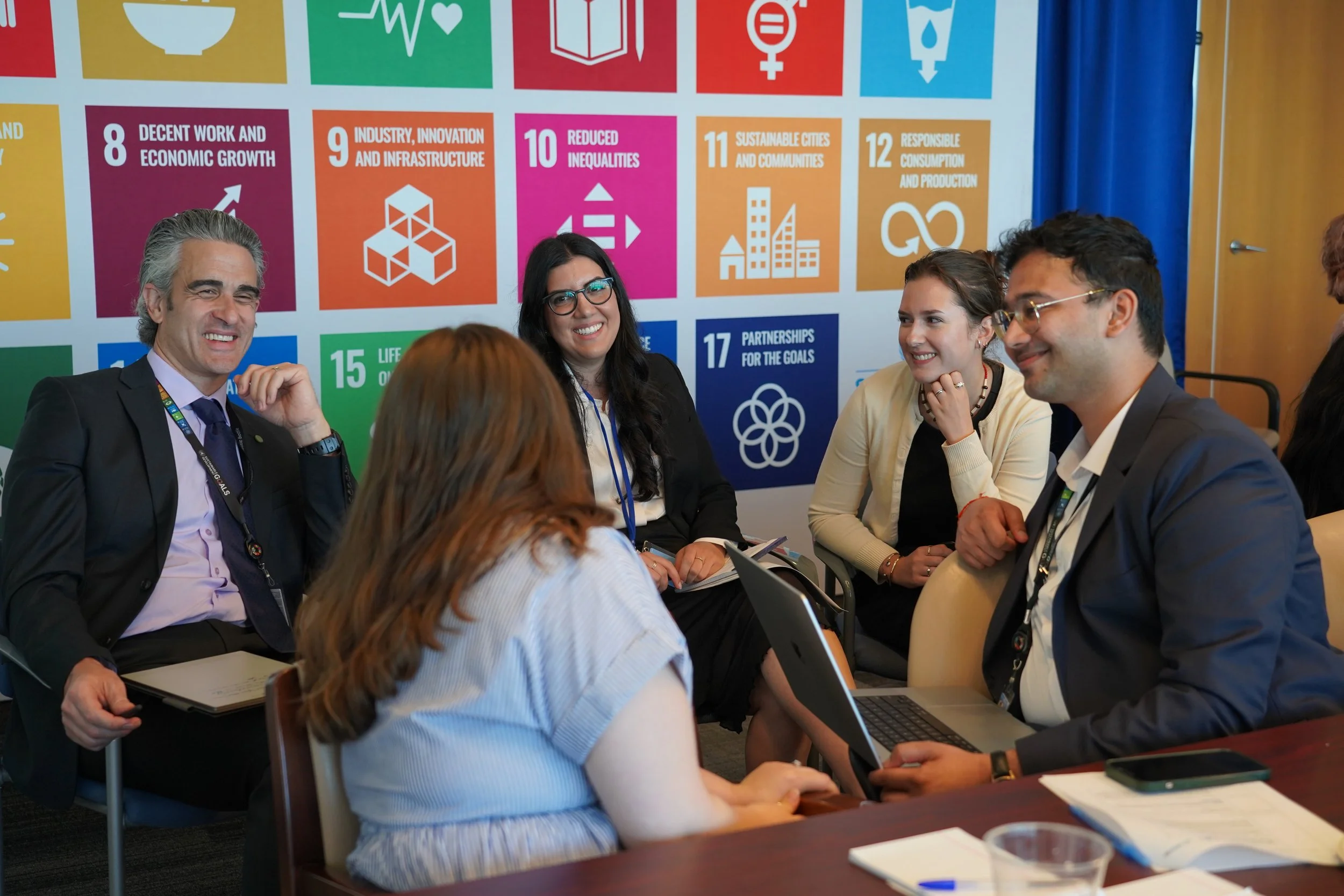Cooperation with Global Actors and Events
The IAU actively fosters engagement with the global higher education community for Higher Education for Sustainable Development (HESD) through collaborative initiatives, knowledge sharing platforms, and strategic partnerships, facilitating the exchange of best practices and innovative solutions to address sustainability challenges in higher education worldwide.
IAU at the UN HLPF
The High-Level Political Forum (HLPF) is the yearly conference of the United Nations where governments, UN Agencies, and civil society come together to discuss the achievements that have been made towards Agenda 2030 and the SDGs.
Previous Years
-
The 2025 HLPF conducted in-depth reviews of: SDG 3. Ensure healthy lives and promote well-being for all at all ages; SDG 5. Achieve gender equality and empower all women and girls; SDG 8. Promote sustained, inclusive and sustainable economic growth, full and productive employment and decent work for all; SDG 14. Conserve and sustainably use the oceans, seas and marine resources for sustainable development; and SDG 17. Strengthen the means of implementation and revitalize the Global Partnership for Sustainable Development. IAU attended the 2025 HLPF with a small delegation, led by the IAU Secretary General, and co-organised events. Learn more here.
-
The HLPF in July 2024 followed the 2023 SDG Summit convened under the auspices of the General Assembly in September 2023. The 2024 HLPF supported the implementation of the Political Declaration and other outcomes of the SDG Summit for advancing the 2030 Agenda and the SDGs. IAU representatives took part in a number of events online and in person, and a researcher on the IAU delegation delivered a statement on Air Pollution. Learn more here.
-
The HLPF in 2023, without prejudice to the integrated, indivisible and interlinked nature of the SDGs, also reviewed in-depth SDG 6 on Clean Water and Sanitation, SDG 7 on Affordable and Clean Energy, SDG 9 on Industry, Innovation and Infrastructure, SDG 11 on Sustainable Cities and Communities, and SDG 17 on Partnerships for the Goals. Read more here.
-
The theme for the HLPF 2022 was “Building back better from the coronavirus disease (COVID-19) while advancing the full implementation of the 2030 Agenda for Sustainable Development”.
Learn more here.
-
The HLPF 2021 was held virtually and the theme was “Sustainable and resilient recovery from the COVID-19 pandemic that promotes the economic, social and environmental dimensions of sustainable development: building an inclusive and effective path for the achievement of the 2030 Agenda in the context of the decade of action and delivery for sustainable development".
Learn more here.
-
As the most global university association contributing to Sustainable Development and having the Consultative Status (the highest status granted by the United Nations to non-governmental organizations) with the Economic and Social Council, IAU took an active part in the debates again this year and co-organized a series of virtual events, together with partners and Members.
Learn more .
-
The HLPF 2019 was dedicated to “ Empowering people and ensuring inclusiveness and equality ”. IAU attended with a delegation of University representatives and partners for the first time, co-organised events, and signed an MOU with ACU and AUF.
Learn more here.
The IAU has Consultative Status with the Economic and Social Council (ECOSOC) which enables participation in this High-Level event, including accreditation of a limited number of participants and the possibility to apply for side events.
UNESCO Education for Sustainable Development for 2030
ESD for 2030 Global Network
The IAU is a partner in the ESD for 2030 Network, following the UNESCO GAP ESD, and launched at the UNESCO World Conference on ESD in 2021. The IAU supports the Berlin declaration and the ESD for 2030 Roadmap.
Transforming Futures
The Transforming Futures: Enhancing Practice for ESD for 2030 through Action Research project led by UNESCO aims to increase knowledge and build capacity of institutions and individuals to transform practices that promote sustainability and quality education in alignment with the SDGs, with the focus on 1. whole-institution approaches (WIA) in ESD, 2. transversal sustainability competences and pedagogies, and 3. learning assessment for ESD.
The project will generate evidence-based technical guidance tools that are validated through action research in these critical areas of ESD and transformative education. Through involvement in this project, education stakeholders can be empowered to partake in innovative teaching practices, and sustainability principles can be further integrated into educational institutions and systems. The findings will help inform and guide future educational practices in other contexts.
The IAU has been tasked with the guidance document on the Whole-Institution Approach (WIA), in close coordination with the other two guidance tools.
-
IAU was a key partner of the UNESCO Global Action Programme on Education for Sustainable Development (GAP ESD) that ended in 2019. The aim of UNESCO GAP ESD was to create and expand initiatives in five key priorities: advance policy, transform learning and training environments, build the capacities of educators and trainers, empower and mobilize youth, and accelerate sustainable solutions at a local level. The IAU is involved in the follow-up programme ESD for 2030, which was launched at the UNESCO World Conference on Education for Sustainable Development in May 2021.
IAU at the UN Ocean Conference
The IAU was pleased to partake in the 2025 UN Ocean Conference in Nice, France. In contribution to the conference, the IAU co-organised a side event with University of Bergen (UiB), INPO - Instituto Nacional de Pesquisas Oceânicas, the International Science Council, and the United Nations Academic Impact (UN AI). Learn more about IAU participation in the conference and the side event here.
IAU at COP
IAU and its Member institutions are committed to working together towards a more sustainable future. Several initiatives were put in place from IAU Members and Partners to stress the role of higher education in research, teaching, student and community engagement at previous COPs, and for the upcoming COP30. Read more here.





